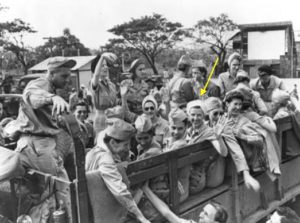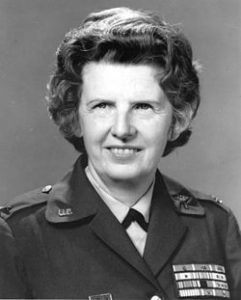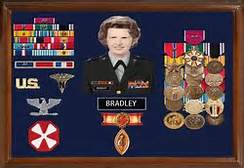Ruby Bradley
The 6/2/2002 issue of the Los Angeles Times obituary read, “Ret. Col. Ruby Bradley, an army nurse who cared for captives in the Philippines during WWII, has died. She was 94.”
Who was this woman? A survivor of over three years in captivity under the Japanese, during which time she nearly starved to death; who was a survivor of two wars (WWII and Korea) and only one of three women who attained the permanent post-war rank of colonel.
The story begins on the morning of December 8th 1941 in the John Hays hospital in Baguio, Luzon, 200 miles north of the Philippine capital of Manila. Thirty four year old 1st Lt. Ruby Bradley, U.S. Army Nurse Corps, was preparing medical instruments for a routine operation.
Suddenly an agitated soldier appeared at her door. “The Japs have attacked Pearl Harbor! All surgeries have been cancelled. Report to Headquarters immediately!”
As she walked to the surgeon’s office, she began to hear explosions. Airplanes with red circles on their wings flew in low to drop their bombs. Lt. General Masaharu Homma’s 14th Army was slamming into the island of Luzon.
Casualties began to appear a few hours later. They were hurriedly treated in the hospital. The army detachment evacuated the base. Shortly thereafter, Homma’s troops arrived and began to round up prisoners. Ruby, another nurse and a doctor fled and hid in the hills. Five days later, they were captured when the couple that was helping to hide them betrayed them to the Japanese in return for favorable treatment by their new captors.
Their former post was turned into a POW camp. Ruby and the remaining medical personnel were forced to treat any and all casualties. Rations were several restricted, consisting of a half cup of rice in the morning and evening. Ruby learned how to steal food, which she shared with the children while going hungry herself. During the 37 months at John Hay, she assisted in 230 major operations and the delivery of 13 babies.
In 1943, she was moved to the Santo Tomas Internment Camp in Manila and remained there until liberation. During that period, she and several other imprisoned nurses earned the title, “Angels in Fatigues” from fellow captives. They carried on with their nursing duties, but with shortages of medicines and medical equipment, many died. “There were several deaths a day, mostly the older ones, who couldn’t take it,” she said after the war. Food rations were the same as they were at John Hay. By the time the camp was liberated in Feb. 1945, the svelte 110-pound Ruby had lost 26 pounds.
Ruby returned to her hometown of Spencer, W.Va. After a long, well deserved leave she was assigned to Ft. Myers, Va. She was promoted to captain and reassigned to McGuire General Hospital in Richmond Va. But not for long. When the Korean conflict broke out, she served as the chief nurse for the 171st Evacuation Hospital. Ruby was off to war again.
 The 171st was in the front lines, treating wave after wave of casualties. Ruby was in the thick it. “It got to the point where I didn’t want to see another drop of blood.” When the Chinese “volunteers” entered the fray, sweeping across the 38th Parallel, the 171stwas directly in their path. Everyone was ordered to evacuate. Ruby sent her subordinates out and stayed to supervise the evacuation. She was on the last plane out.
The 171st was in the front lines, treating wave after wave of casualties. Ruby was in the thick it. “It got to the point where I didn’t want to see another drop of blood.” When the Chinese “volunteers” entered the fray, sweeping across the 38th Parallel, the 171stwas directly in their path. Everyone was ordered to evacuate. Ruby sent her subordinates out and stayed to supervise the evacuation. She was on the last plane out.
In 1951 she was named chief nurse for the 8thArmy and promoted to lieutenant colonel, supervising the work of some 500 nurses in hospitals and aid stations all over Korea.
She came home from Korea to a hero’s welcome, appeared on the TV program “This is Your Life,” and began to collect medals and honors for her lifetime of service. Finally, in 1963, Ruby hung it up. Colonel Ruby Grace Bradley, 55 years old retired, the most decorated woman in U.S. military history.
For her service in two wars, she earned 34 medals, including two Legion of Merit, two Bronze Stars, the WWII Victory Medal and the International Red Cross’ Florence Nightingale Medal.
She passed on May 28th, 2002 and rests in Arlington National Cemetery.
“I want to be remembered as just an Army nurse.”


